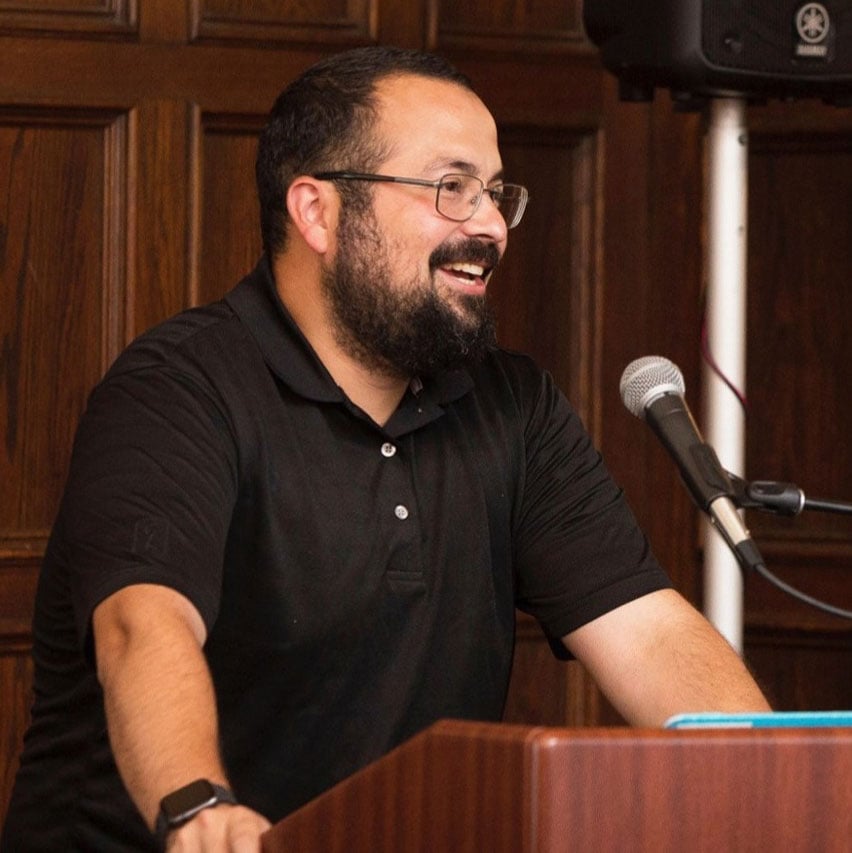
"Innovations in technology have the potential to help society address some of its most fundamental challenges, but also raise harrowing considerations for how they should be governed and regulated.”
Ethan Bueno de Mesquita
Dean and Sydney Stein Professor at The University of Chicago Harris School of Public Policy
The Technology and Society Initiative is a strategy for:
Tech Governance
Harris Public Policy is exploring questions concerning governance issues related to generative AI. A working group of academics from Harris, the University of Chicago, and the Stanford Graduate School of Business – along with policymakers and leaders from companies including Meta, OpenAI, and YouTube – produced recommendations for AI and the 2024 US elections.
Additional working groups are being formed to shed light on myriad concerns that could be alleviated by effective AI governance, including political polarization, misinformation, privacy, market concentration, free expression, property rights, market stability, and many more.
Cyber Policy
As the home of the Cyber Policy Initiative (CPI), Harris seeks to fortify cyber policy by examining the intersection of national security, politics, and technology. CPI serves as a forum through which government officials, academics, and cybersecurity professionals can engage and strengthen cyber posture against malicious actors and attacks.
Through partnerships with DEF CON and domestic and foreign governments, CPI will target several objectives, including publishing a yearly "Hackers' Almanack" to promote cutting-edge cybersecurity policy interventions; establishing a cyber volunteer task force to help secure critical infrastructure, starting with U.S. water utilities and school districts; and helping state and local governments develop cybersecurity strategies, implement recommendations, and craft workforce development plans.
Tech Solutions to Social Challenges
Several Harris research centers and scholars are expanding efforts to study tech’s impact on campaigns and elections, the labor market, health care, education, property rights, public safety, housing, national security, and climate, among other policy areas.
As policymakers grapple with these emerging technologies, The Technology & Society Initiative intends not only to catalyze but also shine a spotlight on the contributions made by Harris scholars and the broader University of Chicago, ensuring rigorous academic research plays a central role in shaping effective policy and unlocking these technologies’ potential for bettering lives.
Discover how Harris researchers use technology to solve society’s toughest challenges.
Featured News

"There was a new huge problem, which was the Chinese hacking our water utilities to pre-position malware in the case of a conflict over Taiwan, so that they can shut off the water in cities all over the country."
.png?width=1920&height=1080&name=Bio%20Circle%20template%20(11).png)
Jacob Braun
Executive Director, Harris Cyber Policy Initiative

Smart Investments for Cybersecurity, with Omid Rahmani
We talk to Omid Rahmani from Fitch Ratings about the intersection of cybersecurity and public finance. He describes the many types of cyber risks governments face, how to budget for digital infrastructure, and why cyber risk is a national security concern. Listen.

AI May Make Shopping for Health Insurance Less Painful
The ACA insurance marketplaces and Medicare.gov all offer varying levels of decision-support tools to recommend health plans right for customers, noted Zarek Brot-Goldberg, an assistant professor at the University of Chicago studying health care markets. - Axios

Ethan Bueno de Mesquita, Dean and Sydney Stein Professor
Ethan Bueno de Mesquita is a leading political scientist whose research applies game theoretic models to the study of conflict, political violence, national security, and electoral politics, he has also written extensively on methodological issues in the social sciences. Under Professor Bueno de Mesquita’s leadership, the Harris School is on the path to become a leading destination for research, teaching, and subject matter expertise in tech policy with a specific emphasis on thorny issues surrounding governance of generative AI.

Oeindrila Dube, Philip K. Pearson Professor of Global Conflict Studies
Professor Dube studies poverty, violence and crime in countries around the world. Recently, in partnership with The University of Chicago Urban Labs Crime Lab, she ran a large-scale experiment with 2000 Chicago police officers, randomizing access to a training program that used simulation consoles to help officers learn to deal better with the cognitive demands associated with complex decision making and information overload. They found that trained officers performed differently in the field: They used force less often, made fewer discretionary arrests, and were less likely to arrest black civilians, while their overall activity levels remained unchanged. Dube is working to scale this research up and to move the training away from simulation consoles into augmented reality or virtual reality.

Ariel Kalil, Daniel Levin Professor
Ariel Kalil's current research examines the historical evolution of income-based gaps in parenting behavior and children’s cognitive and non-cognitive skills. In addition, at the Behavioral Insights and Parenting Lab, she is leading research on EdTech, with a particular interest in the ways that technology can help parents with low income be more effective in supporting young children's development of math and reading skills.

Joshua Gottlieb, Professor
Joshua Gottlieb is an expert on the economics of the healthcare system, including administrative costs, the geography of healthcare, healthcare labor markets, the organization of insurance markets, and physician behavior. His research spans health, labor, urban, and public economics.

Austin Wright, Assistant Professor
Wright's research on substate conflict largely focuses on the political economy of insurgent violence, examining how rebel groups adopt new technologies of war to undermine state rivals. He is currently fielding several studies using tech-associated applications to improve development interventions. He is working with United Nations High Commissioner for Refugees and the World Bank on how to use technology to monitor population movement during conflict. The hope is to evaluate whether and how to scale aid distribution using signals from this platform. He has also worked on a project in Ukraine that used GPS trace data to monitor public responses to government warning systems via an application developed with a Ukrainian tech company.

Gregory Lane, Assistant Professor
Gregory Lane is an Assistant Professor at the Harris School of Public Policy at the University of Chicago. He is a development economist with a current research focus on innovations in finance, technology, and labor markets in developing countries. He, and fellow Harris Public Policy faculty member, Erin Kelley, have fielded a years-long randomized controlled trial on the ways in which tech interventions (in the form of a mobile app) can substantially improve traffic safety in the developing world, in their case by focusing on the behavior of urban minibus drivers in Kenya.

Jacob Braun, Faculty Lecturer
Jacob (Jake) Braun is the Executive Director of the Harris School of Public Policy Cyber Policy Initiative. Mr. Braun previously served as acting Principal Deputy National Cyber Director in the White House from May 2023 to July 2024. Before that, he was Senior Counselor for Transformation to the Secretary of Homeland Security. President Joseph Biden appointed Mr. Braun as Senior Advisor to the Department of Homeland Security’s Management Directorate in February 2021. He is also a lecturer at the Harris School of Public Policy. Mr. Braun is the author of Democracy in Danger: How Hackers and Activists Exposed Fatal Flaws in the Election System and has co-authored three award-winning and seminal works on election infrastructure cyber vulnerabilities. He has worked extensively on national security and finance issues throughout the U.S., Europe, Asia, Africa, the Middle East, and Latin America.
Partnership
Working together to advance data-supported technology policy.

The Technology & Society Initiative: The Impact of Generative Artificial Intelligence on the U.S. 2024 Election
In late August 2023, Harris, in partnership with the Stanford Graduate School of Business, hosted a convening. The goals of the gathering were to generate thoughtful, non-partisan, expert advice to inform ongoing debates concerning the governance of AI and to build connections between academia and industry that foster greater investment in understanding critical issues at the nexus of technology and society.
Representatives joining from technology, industry, and public policy represented a wide range of substantive expertise. Participants discussed topics including the challenges of generative artificial intelligence for the 2024 U.S. Election and opportunities for establishing best practices and governance guidelines.
"Preparing for Generative AI in the 2024 Election: Recommendations and Best Practices Based on Academic Research" is a white paper that resulted from this partnership. It proposes non-partisan, expert recommendations on various critical AI governance issues.
Fellowships

Community Data Fellowship
The University of Chicago has received a grant from the Public Interest Technology University Network (PIT-UN), a partnership of universities dedicated to combining public policy and digital innovation for societal benefit, to create the Community Data Fellows program, a new initiative that works toward the interests of marginalized Chicagoans. To that end, the Fellows program will pair local, community-based nonprofit organizations with UChicago graduate students (Fellows) who possess skills in technology and policy analysis.
Students in the University’s Master of Science in Computational Analysis and Public Policy (MSCAPP) program, jointly led by the Harris School of Public Policy and the Department of Computer Science, are expected to have strong interest in the Fellows program given their commitment to bringing technology and data science to bear on public policy issues.

Effective Government Fellowship
Data and technology approaches unlock a multitude of powerful, novel solutions to improve government functionality, enhancing the ability of public institutions to better serve their citizens. A new University of Chicago program, the Effective Government Fellowship, provides a unique opportunity for UChicago Master’s students to work directly with the United States Congress on technology solutions that improve government efficiency and effectiveness.
The fellowship, made possible by a gift from Harris School of Public Policy alumnus Galen Hines-Pierce, MPP'17, will fund nine students over three years to work on projects in Chicago and Washington D.C. with the legislative branch of the federal government. First-year students in the Master of Science in Computational Analysis and Public Policy (MS-CAPP) program are eligible to apply to the program, which is a partnership between POPVOX Foundation, the Data Science Institute (DSI) and the Harris School of Public Policy.
Course Offerings
Artificial Intelligence for Public Policy
It is hard to name a sector that will not be dramatically affected by artificial intelligence (or machine learning). There are many excellent courses that teach you the mechanics behind these innovations -- helping you develop an engineering skill set. This course takes a different approach. It is aimed at people who want to deploy these tools, either in business or policy, whether through start-ups or within a large organization. While this requires some knowledge of how these tools work, that is only a small part of the equation, just as knowing how an engine works is a small part of understanding how to drive. What is really needed is an understanding of what these tools do well, and what they do badly. This course focuses on giving you a functional, rather than mechanistic, understanding. By the end, you should be an expert at identifying ideal use-cases and thereby well-placed to create new products, businesses and policies that use artificial intelligence.
Big Data and Development
Big Data and Development is a seminar course focused on the use of innovative data capture and analysis techniques to investigate topics related to economic and political development. Microlevel data is increasingly used to target and evaluate development interventions. In this course, students will engage with cutting-edge theoretical and quantitative research, drawing on readings in economics, political science, and data science. The course is organized around a set of core topics, including political and economic development, community-driven aid interventions, causes and consequences of conflict, and climate change. Course assessments will include three short research briefs and a final paper.
Contemporary US Intelligence
The course examines the U.S. Intelligence Community and its role in national security. It will analyze the intelligence cycle including planning and direction, collection, processing, analysis and dissemination. It will also focus on topics such as warning and surprise, denial and deception, covert action, oversight and the role of policy makers, civil liberties, ethics and accountability and intelligence reform. It will also compare the organization and activities of foreign intelligence agencies with the U.S. model. Many of these topics will be analyzed through the context of current events including the congressional investigation into Russia’s interference with the 2016 presidential election. The course will also feature high ranking current and former intelligence officials as guest speakers. No prior study of intelligence issues is required. This course is taught by Congressman Mike Quigley (IL-5), a member of the U.S. House of Representatives Permanent Select Committee on Intelligence, which oversees the activities of the U.S. intelligence community.
Contemporary US Intelligence II: US Threat Assessments - Domestic & International
This course examines the major threats facing the United States through the lens of the US Intelligence Community (IC), both domestically and internationally. Through a series of lectures and guest speakers, students will gain a deeper understanding of the most pressing and pertinent threats to US national security. From a domestic perspective, the course will address threats facing the homeland in regards to domestic terrorism, climate change, political polarization, political extremism and paralysis, and cybersecurity. From an international perspective, the course will address threats faced from our current adversaries, namely, China, North Korea, Russia, Iran, and other hostile states. Students will leave the course with a more thorough understanding of the current threats facing the homeland and how the US can best position itself to address those threats. Additionally, students will more fully comprehend the effects that current public policy has on the United States’ ability to defend itself, both from domestic and international threats. PPHA 33420 Contemporary US Intelligence is not a pre-requisite for this class.
Democracy Hacked: Cyber Threats to Modern Governments in the Digital Age
This course is designed to offer students an overview of the current cybersecurity landscape and the corresponding human rights implications. Students will hear first-hand insider perspectives from public and private sector cyber professionals and international experts across the cybersecurity and human rights fields. Divided into 3 parts, students will gain insight on Cyber Security Technology, Protecting Citizens From Governments Online, and Combating Cyber Predators. Co-taught with Noah Praetz.
The Ethics and Governance of Artificial Intelligence
This course observes the emergence of AI ethics in law and public policy, examining the norms, values, and political strategies involved in the consensus-building processes that shape the development and governance of AI systems. Students will engage in critical analysis of AI policy documents and delve into core principles such as fairness, accountability, and transparency, exploring their origins and practical applications. The curriculum centers on a series of design thinking workshops that will challenge students to debate over the responsible use of AI in real-world case studies, ranging from issues of human rights to sustainable development and geopolitics. By exercising analytical and rhetorical excellence while engaging with the regulatory complexities inherent in the development of advanced technologies, this course is considered a bootcamp for transformative leaders capable of governing AI for the public good.
Explore Course: The Ethics and Governance of Artificial Intelligence Contemporary US Intelligence II
GIS Applications in the Social Sciences
Geographic Information Systems (GIS) refers to tools and techniques for handling, analyzing, and presenting spatial data. GIS has become a powerful tool for social sciences applications over the past thirty years, permitting lines of scientific inquiry that would not otherwise be possible. This course provides an introduction to GIS with a focus on how it may be applied to common needs in the social sciences, such as economics, sociology, and urban geography, as distinct from physical or environmental sciences. Students will learn basic GIS concepts as applied to specific research questions through lectures, lab exercises, and in-class demonstrations. Examples of the kinds of topics we will pursue include how we can use GIS to understand population trends, crime patterns, asthma incidence, and segregation in Chicago.
Science and Technology for Future Policy Wonks
We will cover the broad range of physics and technology topics that are at the heart of current local and national policy debates. The aim of the course will be to give you the tools for distinguishing between sense and nonsense when confronted by technology-based arguments - it is not to turn you into physicists! The course text - "Physics and Technology for Future Presidents", by Richard A. Muller - was written specifically with this aim in mind, and will be used as a general guide to the subject areas that we will cover. Most of the course topics will revolve around energy - its generation, distribution, use, and abuse - but depending on students' interests, we may also go into other areas, such as transportation and national security.
Sustainable Development in the Digital Age
This course examines the complex interplay between digital transformation and sustainable development, focusing on how technological innovation can present both opportunities and unintended consequences in addressing global challenges driven by environmental change and socio-economic disparities. Through scholarly research and critical case studies, participants will explore the environmental and socio-economic impacts of emerging technologies such as artificial intelligence, blockchain, IoT, and advanced data analytics, and develop strategic frameworks for integrating technological solutions with sustainable development goals. The course equips students with foundational knowledge to evaluate the role of technology in international development, understanding how responsible innovation practices can contribute to more sustainable and resilient societies.
Harris is prioritizing greater integration of technology policy into its curriculum, student experience, and career development programs.
Upcoming Events

AI & Democracy
NOVEMBER 16, 2023 | 2:00 PMIn 2024, approximately two billion people will participate in elections worldwide. With the increasing use of generative AI for election-related content, concerns over misinformation, deepfakes, and forgeries are growing. How can voters, candidates, and technology platforms take advantage of this new technology while maintaining trust and transparency in the democratic process? Learn more